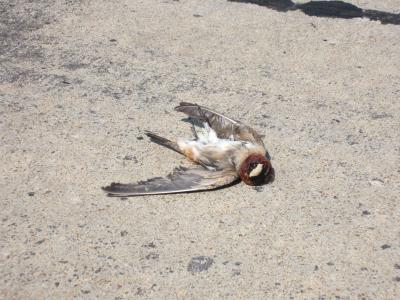 Evolution
Evolution
From the Annals of Microevolution

If finches of the Gal�pagos can enjoy varying beak shapes in response to environmental pressures, why can’t cliff swallows in Nebraska similarly benefit from microevolutionary variations in wingspan? Sure they can. Would anyone doubt it?
The non-shocking discovery is reported in Current Biology (“Where has all the road kill gone?“). Science Now summarizes:
Cliff swallows that build nests that dangle precariously from highway overpasses have a lower chance of becoming roadkill than in years past thanks to a shorter wingspan that lets them dodge oncoming traffic. That’s the conclusion of a new study based on 3 decades of data collected on one population of the birds. The results suggest that shorter wingspan has been selected for over this time period because of the evolutionary pressure put on the population by cars.
“This is a clear example of how you can observe natural selection over short time periods,” says ecologist Charles Brown of the University of Tulsa in Oklahoma, who conducted the new study with wife Mary Bomberger Brown, an ornithologist at the University of Nebraska, Lincoln. “Over 30 years, you can see these birds being selected for their ability to avoid cars.”
Go back and read Tom Bethell’s reflections on “Natural Limits to Variation, or Reversion to the Mean: Is Evolution Just Extrapolation by Another Name?”
Image credit: Current Biology, Brown et al.
